Watch out now, here comes the documentarama, and for the first time out we got that political shit going. We’re going from the small Texas town that President George W. Bush famously called home all the way around the world with the political activists and pranksters the Yes Men, we’re gonna look back through U.S. political history with Robert McNamara, and you’re going to want to know what really went down in Abu Ghraib, trust me on this one. But first, let’s follow Philip Seymour Hoffman around as he pokes and prods his way through the 2000 Republican and Democratic National Conventions.
The Party’s Over
The Party’s Over follows a then relatively unknown Philip Seymoiur Hoffman through the 2000 Presidential campain elections, and he checks out both the Republican and Democratic National Conventions to become more informed of the process, and to find out why certain people get so involved and why others do not. Though Hoffman definitely seems to align more with the sensibilities of the Democratic Party, he does his best to give the Republicans a fair voice and to have their reasons heard clearly. He visits gun shows, NRA conventions, Christian Coalitions and the RNC itself to find out what these people want in a president (answer: family values and honesty). Then he goes to the DNC in LA and finds out what they want in a president (answer: family values and honesty). While at the DNC in LA, Hoffman checks out something called the Shadow Convention, where people like Bill Maher speak and call out both the DNC andRNC for being two halves of the same coin. The most interesting part of the documentary is the focus on protests and the police reactions to them. At both convention, protestors were pushed around and assualted by police forces and some of the footage is crazy, like Rodney King Riots style crazy. I didn’t see Hoffman take on any cops, but I’m sure he had a molotov cocktail tucked away ready to go.
STANDARD OPERATING PROCEDURE
 SOP is an Errol Morris documenatary about the Abu Ghraib scandals, an American-run prison in the Middle East where prisoners were held, questioned and tortured. This kind of stuff is old news (centuries old) but the twist here is the Information Age. Several genius soldiers stationed at Abu Ghraib documented all sorts of abuse throughout the prison, most of them claiming that the pictures were taken with the intention of whistle-blowing, but the pictures leaked to the media first and caused a shit storm. SOP follows the timeline of all these pictures and interviews all the people that were involved in a search for the truth of what happened. This was the first Errol Morris film I’ve seen, and I was surprised by his style and flash. Morris tends to use abstract imagery a decent amount, including great slo-mo shots of playing cards hitting a table and a helicopter explosion as seen from directly below. Morris tells the story in a quick paced, yet thorough manner, and gives the viewers just the right information at just the right times. The subject matter was pretty heavy, but I still enjoyed watching it, and that says a lot about a movie like this.
SOP is an Errol Morris documenatary about the Abu Ghraib scandals, an American-run prison in the Middle East where prisoners were held, questioned and tortured. This kind of stuff is old news (centuries old) but the twist here is the Information Age. Several genius soldiers stationed at Abu Ghraib documented all sorts of abuse throughout the prison, most of them claiming that the pictures were taken with the intention of whistle-blowing, but the pictures leaked to the media first and caused a shit storm. SOP follows the timeline of all these pictures and interviews all the people that were involved in a search for the truth of what happened. This was the first Errol Morris film I’ve seen, and I was surprised by his style and flash. Morris tends to use abstract imagery a decent amount, including great slo-mo shots of playing cards hitting a table and a helicopter explosion as seen from directly below. Morris tells the story in a quick paced, yet thorough manner, and gives the viewers just the right information at just the right times. The subject matter was pretty heavy, but I still enjoyed watching it, and that says a lot about a movie like this.THE FOG OF WAR
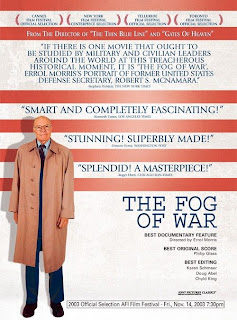 So I followed up SOP with The Fog of War, Morris’s film about Robert McNamara’s influence on US Foreign Policy in the 60s and 70s. McNamara was a self made man and a strategist turned to by Presidents and other higher ups. And in the film, McNamara sits down and looks back in his career, and accounts for everything he said and did in the past, and why he made certain decisions.
So I followed up SOP with The Fog of War, Morris’s film about Robert McNamara’s influence on US Foreign Policy in the 60s and 70s. McNamara was a self made man and a strategist turned to by Presidents and other higher ups. And in the film, McNamara sits down and looks back in his career, and accounts for everything he said and did in the past, and why he made certain decisions.Throughout the movie, McNamara talks directly to the camera (like all of Morris’ subjects) and it feels like he it sitting right there, telling you how it was and why he did what he did. TFOW is an insightful look into how some of the bigger decisions are made and what factors go into the decision making process of war. There is less abstract imagery in this movie than in SOP, but I gather that is because Morris has more actual footage to work with, including old news reels and clips, home video footage and other such old documentary footage. Plus he had the real deal, McNamara himself, sitting in front of a camera, answering his questions. Really can’t beat that.
CRAWFORD
This one is about Crawford, TX, the adopted hometown of a certain infamous President George W. Bush. I admire that someone seemed to have had the foresight to document the entire saga of George Bush moving into Crawford six months before running for President all the way through his final years in the White Office as the sovereign leader of two wars and a disapproving public. Interestingly, what the town went through mimicked what the President went through. When his approval ratings were up, town tourism was at an all time high. And before the Prez moved in, Crawford was straddling the line between a small, pleasant community and a economically depressed near ghost town. With the tourism came the dollars, and with the dollars came some growth, and Crawford slowly started to revive. And then Junior made a few millions Americans upset with this policies, and tourism faded from very Pro-Bush Crawford. What happens to the town eventually is pretty interesting, if not a little sad, as much like America, Bush didn’t seem to leave Crawford a better place from when he found it. What’s the opposite of a Midas touch? The Junior Touch?
Where the film succeeds is in following the lives of certain people throughout their 8 years, with the focus being on a student who is in 8th grade when Bush moves into town, and a struggling 20 year old when we reach the end of the line. The amount of growth a person does from year to year can be exponential in the teens and twenties, and this one student’s growth throughout his teens is interesting to follow, and pretty well done put together. Also interesting is the local Bush souvenir store, which is going under along with the town and El Presidente, and how the store owner seems to be sure that things are going to pick up again, and someday someone will want to come back to Crawford and buy all this “God Bless Bush” crap.
The Yes Men
The Yes Men is a doc about the Yes Men, a pair of political activists who frequently take their causes to the public and to unsuspecting audiences, often in the form of pranks or satirical comedy. Though their net has been cast far and wide over the years, The Yes Men focuses mainly on their protests against corporations and the WTO. These protests consist of speaking engagement at international financial conferences and in front of college classrooms, and their speeches are usually outlandish presentations suggesting that food could be recycled for re-consumption in Third World countries, or that corporate CEOs should be able to conveniently monitor their work forces while away on vacation or off doing some leisurely activities (through the use of an absurd body suit, the unveiling of which got an odd reaction from the captive financial conference audience). This film is very entertaining, even if you don’t care about the WTO or anything else the Yes Men care about – the movie is really about the people and what they go through to get their messages out to whoever will listen, and this is not a surprise, as director Chris Smith would go on to make another great doc called Collapse, which itself is an entertaining film about a person and his beliefs and what he has gone through to get his message out to the world.

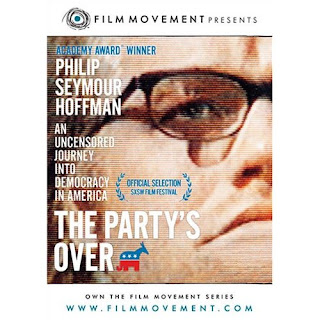

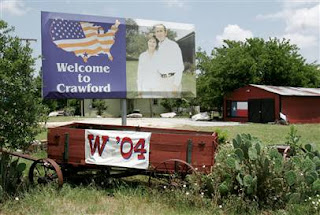
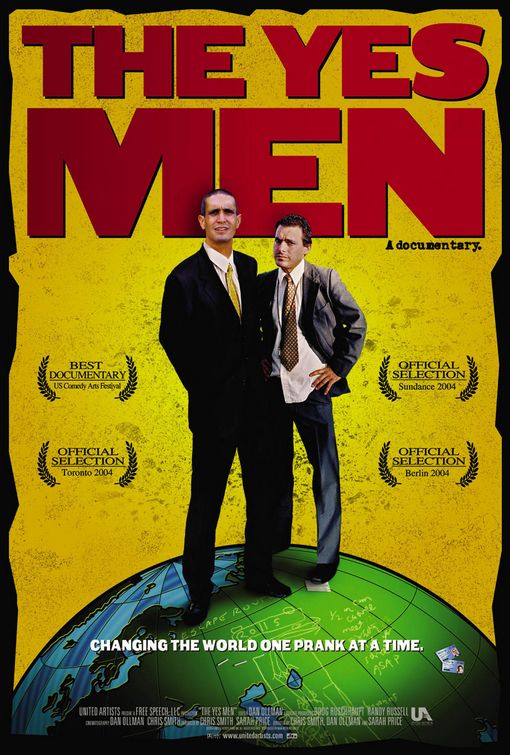
 Review: ‘Guardians of the Galaxy’
Review: ‘Guardians of the Galaxy’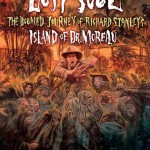 Netflix pick for 10/12/2015 – ‘Lost Soul: The Doomed Journey of Richard Stanley’s Island of Dr. Moreau’
Netflix pick for 10/12/2015 – ‘Lost Soul: The Doomed Journey of Richard Stanley’s Island of Dr. Moreau’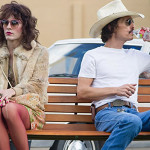 Review: ‘Dallas Buyers Club’
Review: ‘Dallas Buyers Club’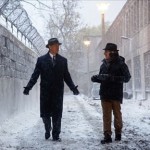 Review: ‘Bridge of Spies’
Review: ‘Bridge of Spies’
Leave a Reply
You must be logged in to post a comment.